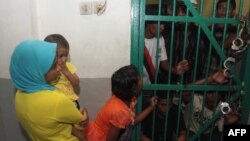A news agency investigation says Thai officials have been secretly allowing Rohingya Muslim refugees to be dumped off to human traffickers, who hold them for ransom under brutal conditions.
The report by the Reuters news agency said Thai immigration officials were often complicit in the policy toward the Rohingya, who are escaping unrest and religious persecution in neighboring Burma.
It said many of the refugees were told by officials they were being deported back to Burma. Only after they were out at sea, did they realize they had been sold to human traffickers.
The survivors say they were then sent to camps along Thailand's remote border with Malaysia. Many were said to be beaten, and some even killed. They were only allowed to leave if their relatives paid thousands of dollars in ransom.
Thai police officials told Reuters they have heard about the camps, but say they are doing nothing at this time to investigate them. They also acknowledged that Thai officials have in the past benefited from Rohingya smuggling operations.
Chris Lewa of the Arakan Project, a Rohingya rights group, tells VOA the camps have been around for a while. But she says conditions there are getting worse, likely because of the rising population.
She says her organization has talked to many refugees at the camps who were beaten in an attempt to extort about $2,000 from family members.
"They are given a mobile phone to call relatives in Myanmar, in Malaysia, wherever, to collect this money. And when they are making that call, they are beaten up so they will scream and cry so the relatives will feel the urge to collect the money as soon as possible."
Lewa says it is not clear what happens to those whose families cannot afford the ransom.
"The people we have met had paid [the ransom], so they don't know what happened to those left behind. We understand that quite a few of them would have been sold, either to a fishing troller or to plantations."
Thailand has come under criticism in the past for its policy toward Rohingya. Many have been deported or turned away at sea. Others are in government detention centers described as overcrowded and inhumane.
The refugees are fleeing violence in Burma's western Rakhine, or Arakan, state, where sectarian violence has killed at least 240 people and displaced 140,000 others, mainly Rohingya, in recent months.
In addition to the violence, Rohingya are denied citizenship and other basic rights in Burma, where they are considered immigrants from Bangladesh. The United Nations considers them one of the world's most persecuted minority groups.
The report by the Reuters news agency said Thai immigration officials were often complicit in the policy toward the Rohingya, who are escaping unrest and religious persecution in neighboring Burma.
It said many of the refugees were told by officials they were being deported back to Burma. Only after they were out at sea, did they realize they had been sold to human traffickers.
The survivors say they were then sent to camps along Thailand's remote border with Malaysia. Many were said to be beaten, and some even killed. They were only allowed to leave if their relatives paid thousands of dollars in ransom.
Thai police officials told Reuters they have heard about the camps, but say they are doing nothing at this time to investigate them. They also acknowledged that Thai officials have in the past benefited from Rohingya smuggling operations.
Chris Lewa of the Arakan Project, a Rohingya rights group, tells VOA the camps have been around for a while. But she says conditions there are getting worse, likely because of the rising population.
She says her organization has talked to many refugees at the camps who were beaten in an attempt to extort about $2,000 from family members.
"They are given a mobile phone to call relatives in Myanmar, in Malaysia, wherever, to collect this money. And when they are making that call, they are beaten up so they will scream and cry so the relatives will feel the urge to collect the money as soon as possible."
Lewa says it is not clear what happens to those whose families cannot afford the ransom.
"The people we have met had paid [the ransom], so they don't know what happened to those left behind. We understand that quite a few of them would have been sold, either to a fishing troller or to plantations."
Thailand has come under criticism in the past for its policy toward Rohingya. Many have been deported or turned away at sea. Others are in government detention centers described as overcrowded and inhumane.
The refugees are fleeing violence in Burma's western Rakhine, or Arakan, state, where sectarian violence has killed at least 240 people and displaced 140,000 others, mainly Rohingya, in recent months.
In addition to the violence, Rohingya are denied citizenship and other basic rights in Burma, where they are considered immigrants from Bangladesh. The United Nations considers them one of the world's most persecuted minority groups.





